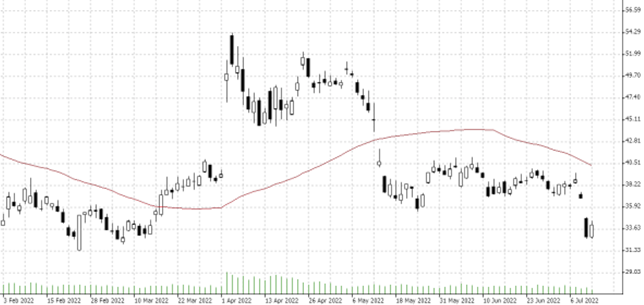

13.07.2022 – Applause, applause: In a dramatic about-face, Elon Musk has called off his purchase of Twitter. The share has lost a lot of value. Perhaps the group will manage to force the purchase through the courts. But Twitter is now damaged goods – perhaps some of the accusations are true, there are many fake accounts. But possibly the bombed-out stock is a buy if management takes the company’s flaws to heart.

Source: Bernstein Bank GmbH
Musk claims that Twitter underreported the number of so-called spam bots. So Twitter is said to have cheated – in fact, the short message service has far fewer real human users than claimed. Twitter counters that Elon Musk admitted he had not even read a detailed explanation from Twitter on the method of estimating fake bots.
Crucial design flaw
Wait a minute: why does Twitter have to estimate this crucial number – does the corporation know exactly how many real users it has, or not? Or is Twitter trying to hide something? In any case, Musk thinks the company’s claim that less than five percent of user accounts are artificial is a massive understatement. Twitter has not provided any clear information about this. We think: The number of fake accounts should be zero.
The second design flaw is Twitter’s blatant left-wing spin. In addition, too many Islamists have free speech. Only conservatives and right-wingers have to stay out.
The cultural chic is always right
So will Twitter fix its web flaws? Probably not. Because the woke avant-garde of the Silicon Valley cultural revolution is not interested in free speech. It wants the leftist seizure of power and has always supported the Democrats. What’s more, as long as Twitter is a virtual monopolist, its management will stick with the pseudo-accounts.
Our conclusion from all this: the stock is likely to retain some unsightly stains from the public washing of dirty laundry in court. We wonder if a savvy businessman like Elon Musk would have really dared to take the difficult step of backing away from a sealed purchase, unless there really is something fishy about Twitter. Only if the allegations are disproven to be absolutely false, or the business is incredibly strong, should things start to look up again. And, of course, if a recession is avoided. But who knows – maybe another prospective buyer will show up soon. We look forward to the next act – Bernstein Bank wishes successful trades and investments!
Important Notes on This Publication:
The content of this publication is for general information purposes only. In this context, it is neither an individual investment recommendation or advice nor an offer to purchase or sell securities or other financial products. The content in question and all the information contained therein do not in any way replace individual investor- or investment-oriented advice. No reliable forecast or indication for the future is possible with respect to any presentation or information on the present or past performance of the relevant underlying assets. All information and data presented in this publication are based on reliable sources. However, Bernstein Bank does not guarantee that the information and data contained in this publication is up-to-date, correct and complete. Securities traded on the financial markets are subject to price fluctuations. A contract for difference (CFD) is also a financial instrument with leverage effect. Against this backdrop, CFD trading involves a high risk up to the point of total loss and may not be suitable for all investors. Therefore, make sure that you have fully understood all the correlating risks. If necessary, ask for independent advice. CFDs are complex instruments and are associated with the high risk of losing money quickly because of the leverage effect. 68% of retail investor accounts lose money trading CFD with this provider. You should consider whether you understand how CFD work and whether you can afford to take the high risk of losing your money.7
